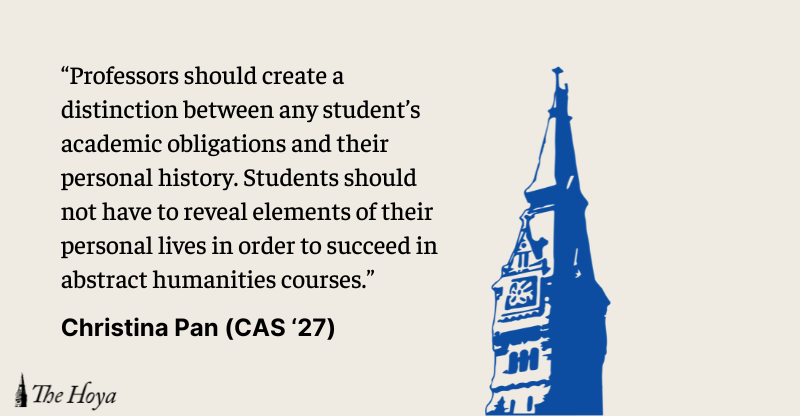
When I opened the first essay assignment for my ethics class last week, I felt as if I had been subjected to a vague personal attack.
There were several prompts, all of which required the student to divulge personal information about a past failure, moral compromise or some hardship they had overcome and reflect on these situations using an ethical framework. A prompt that particularly amused me was the following:
“Why do you think humans suffer? How do you overcome suffering in your life?”
My gut reaction to that question brought back some unsavory memories. Then, I thought about the question more deeply and started to consider more abstract concepts, thinking about ideas from religions like Buddhism and historical reasoning to answer the first part. However, I struggled to answer the second. It wasn’t like I was incapable of writing or thinking about the question, but more so that I didn’t feel like sharing my personal experiences and handing it in for a grade.
Students’ personal experiences should remain just that: personal. Not everyone necessarily has a dramatic or compelling backstory to tell to warrant a very exciting response for these types of questions professors ask. If a student has that dramatic or compelling backstory, the same problem arises. It is impossible for some students to learn in a healthy fashion while being forced to dig into what could be past traumas or unfavorable memories, and impossible for others to write about their personal experiences in a compelling way when “competing” with other personal stories that may be of more interest to a professor.
It can be argued that a degree of suffering and reflection is required to build the “whole person.” There is of course the idea that humans must work hard and suffer to be successful; artists must be starving to produce genius; everyone has to be broken down in order to come back bigger and better.
However, I think this idea of suffering and hardship to build character need not be found in the college classroom, much less the prompts of reliving and retelling difficult memories. The college classroom should be a foundational, healthy stepping stone for students to unlock their full intellectual freedom.
There are other outlets — clubs, personal hobbies and more — that are better suited to these deep and emotional forms of expression and questioning, even more so because they are not done for a grade; they are not directly tied to academic credits and thousands of dollars in tuition.
Professors should create a distinction between any student’s academic obligations and their personal history. Students should not have to reveal elements of their personal lives in order to succeed in abstract humanities courses.
I think this problem is best represented by how a great deal of Georgetown students got here in the first place. In college applications, if a student wants the best chance at admission to a prestigious institution, they must write fully and openly about their identity and past history. This can include digging up the deepest components of personal life and traumas. I see this component as a necessary evil –– a college must know who they accept.
However, I argue that a class does not need to have this same component. We’re already at this college and already have surrendered so much of our histories. There’s not a clear need for more of that.
The humanities ask us to question the nature of existence, of beauty, of relationships. I encourage professors to ask us those difficult questions in class to prompt our thought processes and open discussion, but not when assigning our essays, midterms and finals. Those papers should be material in nature and context-based, asking us to primarily derive content from readings or source materials, not our personal lives.
This type of introspection –– thinking about the why and how we are here, what we do, what we should do –– has to be coaxed out of students, not forced out for a paper or project. After taking these courses and being introduced to more complex, impersonal situations, engaged students will start to consider their own lives rather than being bluntly asked to spell out their experience on paper.
Let things happen when they happen. Prompting students to start thinking about these questions can be helpful, but don’t force them to scramble up all their past memories and experiences in the last 18 to 20 years or so and dilute it down to writing a simple essay, then grading it.
Getting back to those ethical questions, how do you overcome suffering in your life?
Maybe the better question is: “Why should I have to relive it just to get an A?”
Christina Pan is a sophomore in the College of Arts & Sciences.